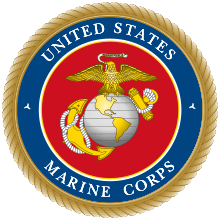2d Antiaircraft Artillery Battalion
The 2d Antiaircraft Artillery Battalion (2d AAA Bn) was a United States Marine Corps antiaircraft unit that served during World War II. Formed in 1940 as the 2d Defense Battalion, its original mission was to provide air and coastal defense for advanced naval bases. During the war the battalion defended Hawaii, Tutuila in American Samoa and Guam and took part in combat operations at Tarawa Atoll and Okinawa. The battalion returned to the United States after the war and was decommissioned at Marine Corps Base Camp Pendleton, California on 28 November 1945.
| 2d Antiaircraft Artillery Battalion | |
|---|---|
| Active | |
| Country | |
| Branch | |
| Type | Air Defense/Coastal Defense |
| Size | ~1,300 men (1942) |
| Part of | V Amphibious Corps |
| Engagements | World War II *Battle of Tarawa *Battle of Okinawa |
| Commanders | |
| Current commander | N/A |
| Notable commanders | Bertram A. Bone Thomas E. Bourke Charles I. Murray |
History
World War II
The 2d Defense Battalion was commissioned on 1 March 1940 at San Diego, California.[1] Lieutenant Colonel Bertram A. Bone was the first commanding officer of the battalion.[3] Because of the Marine Corps' rapid growth beginning in 1939, there was a great deal of movement amongst leadership as the institution struggled to keep pace. This led to the battalion having five commanding officers by the time the war began in December 1941.[4] The battalion was the only defense battalion still stateside when war broke out. They deployed to Hawaii in December 1941 and quickly prepared for follow on tasking.[4] The battalion arrived in American Samoa in January 1942 to assist the 7th Defense Battalion with air and coastal defense of the region.[3]
In November 1943 the 2d Defense Battalion was assigned to the V Amphibious Corps for the Battle of Tarawa. They came ashore on 23 November after most of the battle was complete in order to garrison the island against Japanese counterattack from the air.[5] For this operation the battalion was reinforced by one half of the 2d Airdrome Battalion which came in from the Ellice Islands.[6] Following operations at Tarawa the battalion also served on Guam and was again moved to Hawaii.
As the war progressed, the Marine Corps removed coastal artillery from the defense battalions in order to form additional heavy artillery units for the Fleet Marine Force.[2] Because of the divestiture of the coastal defense mission, the battalion was redesignated as the 2d Antiaircraft Artillery Battalion on 16 April 1944 while on Kauai.
The 2d AAA Battalion was one of four AAA battalions that comprised the 1st Provisional AAA Group during the Battle of Okinawa.[7] During the battle they were emplaced near Yontan Airfield in order to protect the airfield against Japanese air raids and kamikaze attacks.[8]
At the end of the war the battalion returned to the United States and was decommissioned on 28 November 1945.
See also
- Marine Defense Battalions
- List of United States Marine Corps aviation support units
Citations
- Rottman 2002, pp. 211.
- Rottman 2002, pp. 216.
- "Special Marine Units of World War II – USMC Military History Division" (PDF). USMC Military History Division. Retrieved 2017-12-27.
- Melson 1996b.
- Hammel & Lane 2006, pp. 245.
- Rottman 2004, pp. 54-55.
- Rottman 2004, pp. 88.
- Nichols & Shaw 1955, pp. 200.
References
- Bibliography
- Hammel, Eric; Lane, John E. (2006). Bloody Tarawa: The 2d Marine Division, November 20-23, 1943. St. Paul, MN: Zenith Press.
- Nichols, Charles S., Jr.; Shaw, Henry I. (1955). Okinawa: Victory in the Pacific. United States Marine Corps Historical Branch.
- Rottman, Gordon L. (2002). U.S. Marine Corps World War II Order of Battle: Ground and Air Units in the Pacific War, 1939–1945. Greenwood Press. ISBN 0-313-31906-5.
- Rottman, Gordon L. (2004). US Marine Corps Pacific Theater of Operationss 1944-45. Osprey Press. ISBN 1841766593.
- Web
- Melson, Charles D. (1996b). Condition Red: Marine Defense Battalions in World War II (PDF). Marines in World War II Commemorative Series. Washington, D.C.: Marine Corps Historical Center. LCCN 96174419. OCLC 34920984. Retrieved 2020-05-17. Part 2
